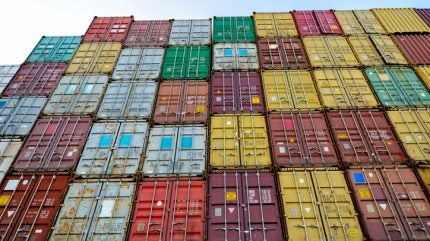
The US has halted plans to impose tariffs on imports from Canada after talks between President Trump and Canadian Prime Minister Justin Trudeau.
But a 10% levy on Chinese imports has come into effect today (4 February) and Beijing has retaliated by saying it will slap tariffs on certain goods imported from the US.

Discover B2B Marketing That Performs
Combine business intelligence and editorial excellence to reach engaged professionals across 36 leading media platforms.
The eleventh-hour reprieve for Canada came just hours after Trump had agreed a similar deal with Mexican President Claudia Sheinbaum that “paused” the introduction of a planned 25% tariff on Mexican imports that had also been due to be introduced today.
As with Mexico, the 25% tariff set to hit Canada has been put on hold for a month.
After talks with Trump, Trudeau set out a package of measures to tighten border security, some of which had already been announced towards the end of the presidency of Joe Biden.
“I just had a good call with President Trump. Canada is implementing our C$1.3bn ($900bn) plan – reinforcing the border with new choppers, technology and personnel, enhanced coordination with our American partners, and increased resources to stop the flow of fentanyl. Nearly 10,000 frontline personnel are and will be working on protecting the border,” Trudeau said in a statement on X.

US Tariffs are shifting - will you react or anticipate?
Don’t let policy changes catch you off guard. Stay proactive with real-time data and expert analysis.
By GlobalData“In addition, Canada is making new commitments to appoint a fentanyl czar, we will list cartels as terrorists, ensure 24/7 eyes on the border, launch a Canada-US Joint Strike Force to combat organized crime, fentanyl and money laundering. I have also signed a new intelligence directive on organized crime and fentanyl and we will be backing it with $200m.”
Canada, like Mexico, had announced it would reciprocate to the US threat by imposing a 25% tariff on US imports while certain provinces – notably Ontario – said they would ban the sale of alcohol imported from the country’s southern neighbour.
The US and Canada are major trading partners for shelf-stable food and alcohol. Canada is the number one exporter of grain, livestock, meat and poultry to the US.
Canada is the US’ second-largest trading partner, after Mexico, accounting for 14.3% of US trade. However, the US has a trading deficit with Canada, which is another of Trump’s gripes.
Speaking before the one-month pause was announced by Trudeau, Dr. Sylvain Charlebois, a professor and researcher of food distribution and policy at Dalhousie University in Canada, argued the 25% tariff threat was a “wake-up call” for Canada’s agri-food sector.
“As a nation that prides itself on food security and a robust agricultural trade surplus, Canada now faces a critical test of its ability to remain competitive in an increasingly protectionist global economy,” he said.
Meanwhile, China has responded to the start of US tariffs – again linked by Trump to the import of fentanyl – by introducing tariffs of its own, of either 10% or 15%, on a range of US imports including agricultural machinery, coal and natural gas.
However, a full-on trade war between the world’s two largest economies could be averted as China’s levy on US goods is not due to be introduced until next Monday (10 February) and Trump is due to hold talks with his Chinese counterpart Xi Jinping.
Trump has also threatened to impose tariffs on European Union imports, telling UK broadcaster the BBC they could happen “pretty soon”.





